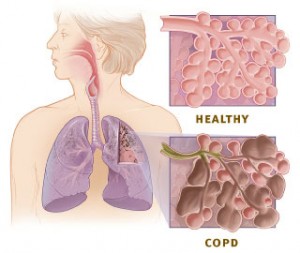Nov 18: Chronic Obstructive Pulmonary Disease Day
 Bermuda Hospitals Board (BHB) and Open Airways are marking World Chronic Obstructive Pulmonary Disease (COPD) Day on Thursday, 18 November with an Open House in the lobby at King Edward VII Memorial Hospital.
Bermuda Hospitals Board (BHB) and Open Airways are marking World Chronic Obstructive Pulmonary Disease (COPD) Day on Thursday, 18 November with an Open House in the lobby at King Edward VII Memorial Hospital.
COPD is a major cause of disability as well as a leading cause of death. Worldwide, more women die of COPD than breast cancer and more men die of COPD than prostate cancer.
“Many people have COPD and don’t know it,” explains Debbie Barboza, from the hospital’s Asthma Education Centre. “Some think their symptoms are just a natural part of the aging process. However, COPD is a life-threatening disease that will get worse if not treated.”
COPD develops slowly over years. Symptoms often worsen over time and can limit your ability to do routine activities for many years. Severe COPD may prevent you from doing basic activities like walking, cooking, traveling, or even taking care of yourself.
Most of the time, COPD is diagnosed in middle-aged or older people. The disease is not passed from person to person—you can’t catch it from someone else.
“COPD has no cure yet and doctors don’t know how to reverse the damage to the airways and lungs,” says Liz Boden of Open Airways. “However, treatments and lifestyle changes can help you feel better, stay more active, and slow the progress of the disease.”
COPD is usually caused by smoking. Symptoms include coughing, bringing up phlegm or mucus and getting short of breath.
“If you are over 40, with a history of smoking and have these symptoms see your doctor,” advises Ms. Barboza. “A simple breathing test called spirometry can help diagnose COPD. The test is quick, painless and can be done at the hospital with a doctor’s referral.”
The good news is that COPD can be treated. Although there is no cure, people with COPD can feel better and slow damage to their lungs, especially if they educate themselves. The earlier a diagnosis is made, the more effective the treatment will be.
“It is important for people to realize that COPD can be prevented,” concludes Ms. Boden. “If you are a smoker, quitting smoking is the best way to prevent COPD or stop its progression. It is never too late to quit smoking. You may be breathless, but you are not helpless!”
To make an appointment for COPD education, call the BHB Asthma Education Centre at 239-1652 or Open Airways at 232-0264.
Members of the public are invited to attend the Open House on November 18, from 8:30am to 2:30pm in the lobby at KEMH. Adult lung screening, free spacers and information on COPD will be available.
Symptoms of COPD:
- · A cough that won’t go away.
- · Bringing up phlegm or mucus when you cough.
- · Getting out of breath when you do physical activity, such as walking up a flight of stairs, walking the dog, shopping or getting washed and dressed.
Suggestions, provided by BHB, for people diagnosed with COPD:
- · Stop smoking. Ask for help to quit.
- · Talk to a doctor or nurse about pills, special gum, or patches for your skin to help you stop smoking.
- · Tell friends and family you are trying to quit and ask them to keep cigarettes out of the house.
- · Take each medicine the way the doctor says to take it. Go to the doctor at least two times a year for checkups.
- · Talk about your medicines at each visit and make sure you understand how to take each one.
- · Ask if you can get a flu shot.
- · Go to the hospital or doctor right away if your breathing gets bad.
- · Plan ahead with phone numbers, directions to the doctor, and other information in one place so you can act fast.
- · Keep the air clean at home.
- · Stay away from things like smoke and fumes that make it hard to breathe.
- · Open doors and windows when you are cooking and when the air inside is smoky or has strong smells.
- · Keep your body strong. Walk, exercise regularly, and eat healthy foods.
- · If your COPD is severe, get the most out of your breath. Make life as easy as possible at home.
- · In the kitchen, bathroom, and sleeping area, put things you need within easy reach.
- · Find simple ways to cook, clean, and do other chores.
- · Ask your friends and family for help.
Read More About
Category: All

